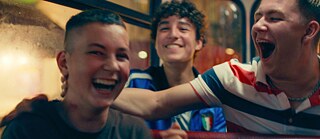A fragile childhood, turbulent love and adolescence in a social flashpoint – German films are portraying very different images of the past.
The seventies, eighties, nineties and the hits of today – it sounds like a bad radio station jingle, but this year’s Berlinale quite effectively signposts you through the decades, and German films are well represented too. Sonja Heiss’s lovely coming-of-age-Film Wann wird es endlich wieder so, wie es nie war (When Will It Be Again Like It Never Was Before; Generation) – incidentally this is also a great Berlinale title that’s always relevant – begins in the 1970s in West Germany. Not everyone grows up in the grounds of a psychiatric hospital like Josse, the young son of a doctor – and like the author, director and award-winning actor Joachim Meyerhoff, who wrote the best-selling novels on which the film is based. But this is normal for the boy in the film, and the perspective on the patients in the film is no less affectionate. Then everything breaks down for completely different reasons. Josse experiences grief, first love and loss – it’s what you might call growing up.In the Competition category, Emily Atef looks back with a more idyllic gaze in Irgendwann werden wir uns alles erzählen (Someday We’ll Tell Each Other Everything), a love drama from the summer of German Reunification in 1990. The reference to historical circumstances is marginal, but Atef’s images of an East German rural idyll bathed in light do evoke the dawn of a new era. Less remarkable are the somewhat stereotypical dialogues and comments on the circumstances at the time (“Money rules now, the Deutschmark!”), as well as a few robust sex scenes between 18-year-old Maria and Henner, aged twice that. Desire to do something forbidden, to play around with control and submission, these things touch heavily on taboos.
You don’t stand a chance …
The opposite of nostalgia is delivered by Sonne und Beton (Sun and Concrete; Berlinale Special) by David Wnendt, who has made Felix Lobrecht’s autobiographical bestseller into a movie about the successful stand-up comedian, podcaster and author of a novel. This exploration of adolescence in Berlin’s Gropiusstadt housing estate, famous from Christiane F. – Wir Kinder vom Bahnhof Zoo (1981), is initially unsettling with its brutality, ultra-hard gang language and complete hopelessness, but also fascinating with an inexplicable poetry. The Berlinale panel might not have found Wnendt’s foray into the year 2003, the most difficult phase of the Reunification period in social terms, quite artificial enough for the Competition. The film does not quite follow in the footsteps of La Haine (1995) or Trainspotting (1996). Nevertheless the brutal yet sensitive drama about Lukas, Julius, Gino and Sanchez deserves every attention, because it certainly has – on an international scale – something that the kids in this film don’t have, and that’s a chance of success. It remains to be seen whether the as yet unseen Competition entries are able to punch with such convincing power.Related Links
February 2023
